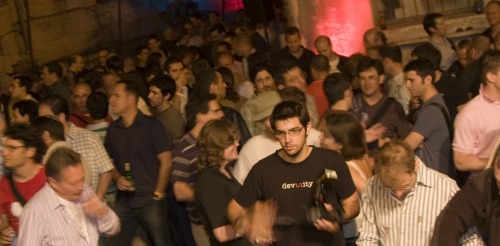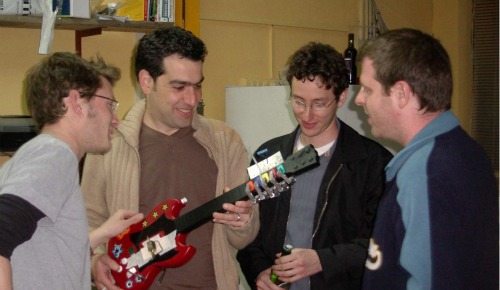Pot-luck dinners and guest appearances by the world’s top techies characterize GarageGeeks, an informal but influential Israeli ‘high-tech incubator.’

Where do Israel’s high-tech elite meet to greet top tech personalities from around the world – such as Sergey Brin (co-founder of Google), Thomas Curran (CTO of Deutsche Telekom), Craig Mundie (chief research and strategy officer of Microsoft) and Jimmy Wales (co-founder of Wikipedia)?
Would you believe in a garage – in Holon, of all places?
Actually, says Nimrod Lehavi, one of the folks who runs GarageGeeks, “we’ve outgrown the garage, because so many people attend our events. But we’ve still got that garage attitude.”
By “garage attitude,” Lehavi means the spirit of entrepreneurialism that has turned GarageGeeks into a kind of Israeli tech salon. “Over the years, we’ve had thousands of people come to our events, and we’ve worked on many interesting projects. And, of course, we’ve had a lot of interesting guests from the high-tech world come to speak to us,” Lehavi says.
Over pot-luck meals thrown together from whatever guests decide to bring, GarageGeeks meetings feature discussions of the latest, often whimsical, tech projects by the more active members. Recent projects include converting a standard skateboard into a controller for the Wii game “Tony Hawk Pro Skater,” and an upcoming event will feature ways to hack Microsoft Kinect, the last word in 3D motion control, Lehavi says.
Ideas hatched in the garage
Crazy ideas, dedicated geeks, and pot-luck junk food: It’s the sort of thing you would expect to see in a movie about an Internet startup – except at GarageGeeks, it’s real life, as are the crazy ideas. The people who run GarageGeeks – Lehavi, Rafael Mizrahi, Tal Chalozin, Yuval Tal, Doron Nir, Yossi Vardi and others – have been responsible for some of the biggest innovations to come out of Israel.
Vardi was one of the brains behind ICQ, while GarageGeek Gil Hirsch started Face.com. “I can honestly say that many of the big – and not so big – ideas in Israeli high-tech started from a conversation or presentation we had at GarageGeeks,” says Lehavi, a software developer who has done projects for myriad Israeli Internet companies. “If for nothing else, many people come to our events in order to meet other like-minded innovators.”
The dizzying array of well-connected guest speakers, many of whom were recruited by Vardi, most recently included Google’s Brin as well as Carl Bass, CEO of Autodesk, on the occasion of the acquisition of Israel company PlanPlatform. Facebook genius Mark Zuckerberg hasn’t been there yet, but Elliot Schrage, Facebook’s VP of global communications, has. Dr. Jeff Jaffe, CEO of the World Wide Web Consortium, spoke last May; before him it was Microsoft’s Mundie.
And let’s not forget Tina Armstrong, CEO of AOL; Moshe Lichtman, president of Microsoft R&D Israel – and even web journalist Ariana Huffington. While to the best of Lehavi’s knowledge, no international tech figure has come to Israel just to speak at GarageGeeks, it seems that none of them miss coming when they are here on business.
Investors and do-gooders
Naturally, a group like this attracts the attention of not only innovators, but of those who hope to make money off their ideas – like venture capital firms and angel investors. Lehavi says GarageGeeks members have been approached by VCs numerous times about notions first floated at meetings.

One idea that started out in the Holon garage, broached by Tal Chalozin and Zvika Netter, morphed into successful startup Innovid, which specializes in online video advertising. Chalozin and Netter, both active in GarageGeeks from the beginning, closed a $3 million financing round with Genesis Partners in 2008 and last September raised $4 million from T-Ventures, the venture capital arm of Deutsche Telekom.
GarageGeeks, besides being a bubbling cauldron of tech ideas, is also a non-profit organization that chooses to extend its goodwill to social service projects. Last Purim, dozens of GarageGeeks showed up at the Bialik-Rogozin School, attended by hundreds of at-risk kids, for a Purim party given by American tech innovator Jeff Pulver.
Outgrowing the garage
Attendance at the events varies depending on the content being offered, says Lehavi. “We usually get between 100 and 300 people for one of our regular meetings, although that can grow to as many as 1,000 when we have a special guest. Usually, we hold those meetings outdoors, because the usual places we host meetings aren’t big enough to hold such a crowd,” he explains.
Each event brings out new people. “I always ask for whom this is the first event, and there is always a healthy show of hands.” Indeed, networking – giving people time and space to get to know each other and discuss projects – is a major aspect of the GarageGeeks experience, which is really, for all practical purposes, an informal tech incubator.
Is it a good place to look for a job? “Absolutely!” says Lehavi. “We don’t advertise our programs – it’s all via word of mouth or on our Facebook page – so only those really interested in what we are doing will actually come out to the events.
“But those that do are the ones who are the most motivated, and the ones who will come up with tomorrow’s big tech ideas,” Lehavi stresses. “It’s not just a garage – it’s a high-tech community.”












